
By:
- Rachel McNellis
Published Date
By:
- Rachel McNellis
Share This:
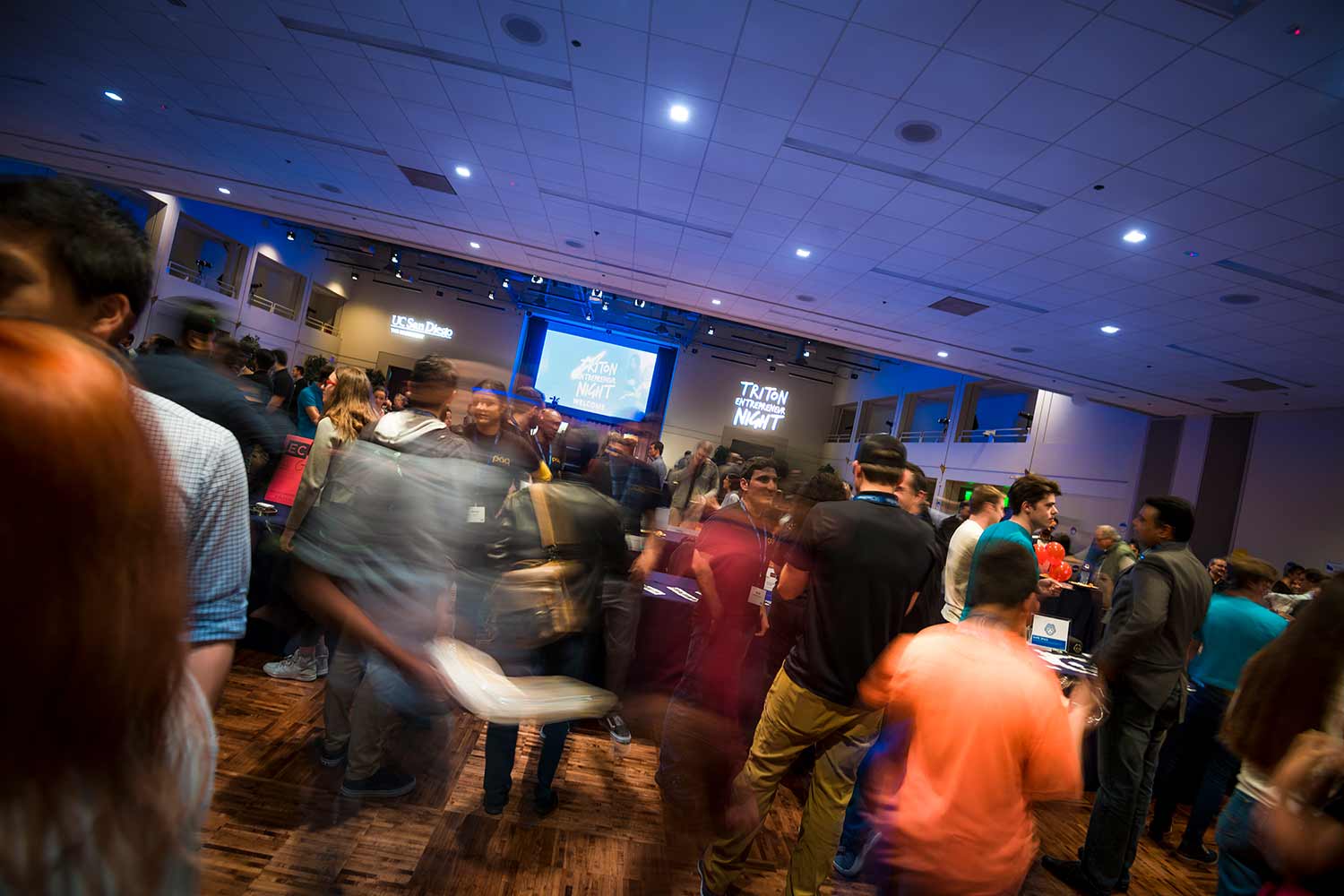
Innovation abounds at Triton Entrepreneur Night, showcasing many student companies within The Basement working to address societal issues and disparity. Photo by Erik Jepsen/UC San Diego Publications
Three Social Innovators to Watch
Student entrepreneurs rise up from The Basement
Beneath Mandeville Auditorium, down a stairway once covered in graffiti and into a lofty open room, concepts are blooming. Connections are being built. Students are discussing business models, designing prototypes. New ideas emerge from underground.
This is The Basement—an undergraduate business incubator founded in 2015 with support from alumni Jeff and Kim Belk ’83, Aryeh Bourkoff ’95, and Mark Suster ’91. Established as a space for students to explore innovation and creative entrepreneurship, The Basement has cultivated not just student startup businesses, but has nurtured students striving for social impact as well.
Social impact drives many teams at The Basement, six of which were showcased May 31 at The Basement’s yearly signature event, Triton Entrepreneur Night. The teams competitively pitched their ideas, Shark Tank style, to a panel of esteemed investors and entrepreneurs.
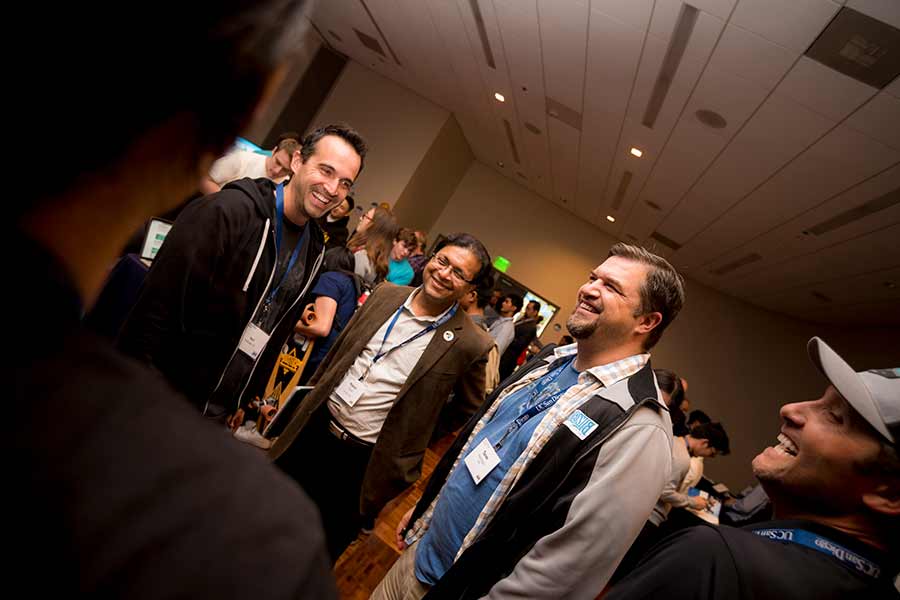
Triton Entrepreneur Night attendees (L-R) Ned Halicioglu ’01, professor Rajesh Gupta and event judges Taner Halicioglu ’96 and Eric Gasser talk among the student business presentations. Photo by Erik Jepsen/UC San Diego Publications
This year’s judges included Taner Halicioglu ’96, founder, Keshif Ventures; Allison Long Pettine ’04, founder, Crescent Ridge Partners and of SEED San Diego; Eric Gasser, founding partner, SEED San Diego; and Ryan Hodson, founding investor of several funds including Kodiak Capital, Sway Ventures and Yeats Investments . The winning teams were announced by Emeke Okeke, PharmD 12, founder of RISE Global Health Initiative; Amanda Schochet, ’11, MS ’14, co-founder of MICRO; and Prince Ghuman, ’08, professor of marketing, communications and entrepreneurship at Hult Business School.
The judges selected two winning teams: Educational Vision Technologies (Accelerator Track), which uses computer vision and deep learning algorithms to enhancing the learning experience and Osteolux (Incubator Track), an all-inclusive curing system for orthopedic surgeons to improve operating room efficiencies. The winning teams from the Accelerator and Incubator tracks will receive $3,000 each plus $25,000 in legal services and additional noncash prizes from the event’s sponsors.
This year’s Audience Choice Award, One Village Philippines, designs affordable and easily reproducible solar-powered street lamp to address the need for reliable outdoor lighting in rural areas. Their ultimate goal is to foster economic development and provide community members with a reproducible design that they can build themselves using readily available materials. The Audience Choice team will receive $1,000.
The additional funding and connections to knowledgeable alumni give student entrepreneurs the opportunity to take their work a step further. “Winning TEN last year was a huge stepping stone for us. It opened up doors for the startup to continue to grow and gain traction,” says Ashna Shroff ’17, COO of last year’s winning team, Sin Fronteras Tax, a startup serving as an intermediary to bring speedy tax returns to international workers.
Tiny Socks and Security Blankets
Among the UC San Diego student teams is Hapty Hearts, a startup working to support mothers through the challenges of the postpartum period. One of the biggest trials, they’ve found, is perinatal mood and anxiety disorders (PMADs), a set of mental health disorders that are common in pregnant women during pregnancy and after giving birth. “PMADs can affect women in low-income families and households at almost double the rate,” says co-founder Niranjanaa Jeeva ’19. “That was something that was just unacceptable.”
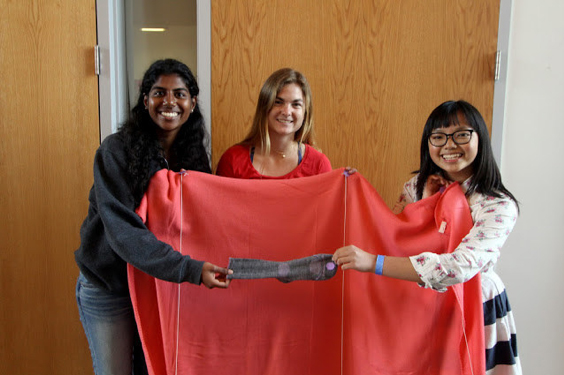
Hapty Hearts co-founders Niranjanaa Jeeva ’19, Ella Stimson ’19 and Julie Yip ’18 display their prototype.
Jeeva and Hapty Hearts co-founders Ella Stimson ’19 and Julie Yip ’18 are currently prototyping a wearable device that would be available low-cost to families most affected by PMADs. Using haptic feedback, or touch feedback, the devices will connect mother and baby through heartbeat. The wearables will come in the form of a sock for baby and blanket for mother, and will help to alleviate the symptoms of PMADS, which can include anxiety and depression. The technology could have other applications in the future. “It might be good for children with autism who are having difficulty connecting with other people, or it could have potential for premature babies,” says Yip.
Hapty Hearts came to The Basement last year and is taking full advantage of the space’s mentorships, meeting spots, and prototyping tools to develop their brand. Their affiliation with The Basement has given them the opportunity to participate in events like UC San Diego & You: Silicon Valley, an alumni networking event where they met Albert P. Pisano, dean of Jacobs School of Engineering, who served as a user tester for their prototype. “It was the highlight of my college career,” says Jeeva.
Serving the City
Another team from The Basement is not creating consumer products. Instead, this team of students seeks to make change through service. Led by founder and director Anika Ullah ’18, Intersectional Health Project San Diego (IHPSD) is a student-run organization aiming to tackle public health issues that affect immigrant, refugee, and low-income communities across San Diego. The organization started out as a multimedia project aiming to simply raise awareness of public health issues in those communities, but the organization quickly realized they could do more.
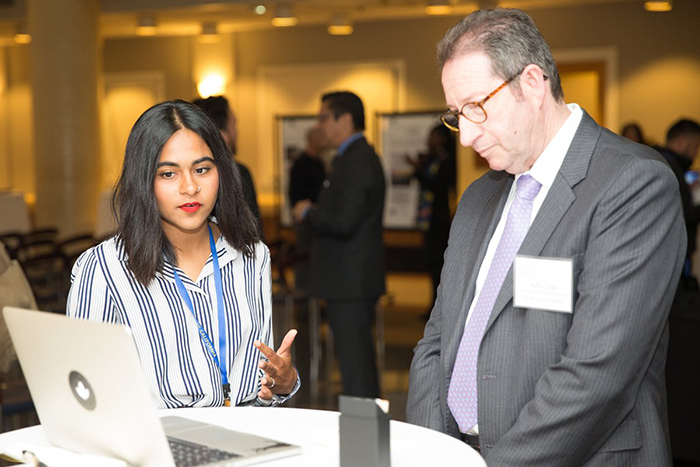
Anika Ullah ’18, founder and director of Intersectional Health Project San Diego, presents her research at an undergraduate showcase in Sacramento. Photo by Lauren Alisse
Ullah and 25 other students who have since joined the project now use The Basement to organize and strategize on projects across the city—the largest of which takes place in San Diego’s Barrio Logan neighborhood, a vibrant and diverse area home to Monarch School, a center for at-risk homeless youth. The school is located in an area that not only draws traffic from large, commercial trucks, but is also known to be the site of San Diego’s recent Hepatitis A outbreak. The IHPSD team is working with the San Diego Housing Commission and local community outreach center, The Global Arc, to mobilize the community in the creation of a safe school zone for these students.
Keeping with their original goal of outreach and education, IHPSD continues to document projects like the Monarch School mission on their website, and uses multimedia articles to share the stories of community members. “Maybe I’m a huge optimist,” says Ullah, “but I believe that most of the problems we have on this planet are problems because people don’t know enough about them. We want to change that however we can.”
Driving Change Across Borders
Combining both a product and service is The Basement team Baja Del Sol, focused on solving issues of water insecurity in Baja California, Mexico. Every quarter, the team of Jacobs School of Engineering students travels to Tijuana to install high-quality, low-cost solar water heaters in orphanages, replacing systems that are typically old and grossly inefficient. The team intends to mitigate the financial burden of these orphanages, which are often underfunded. Where a typical thermal water collector can cost up to $2000, the technology they designed only costs around $180 to make. “Our system is simple and it works really well,” says Joanne Hsu ’18, team lead for the spring quarter.
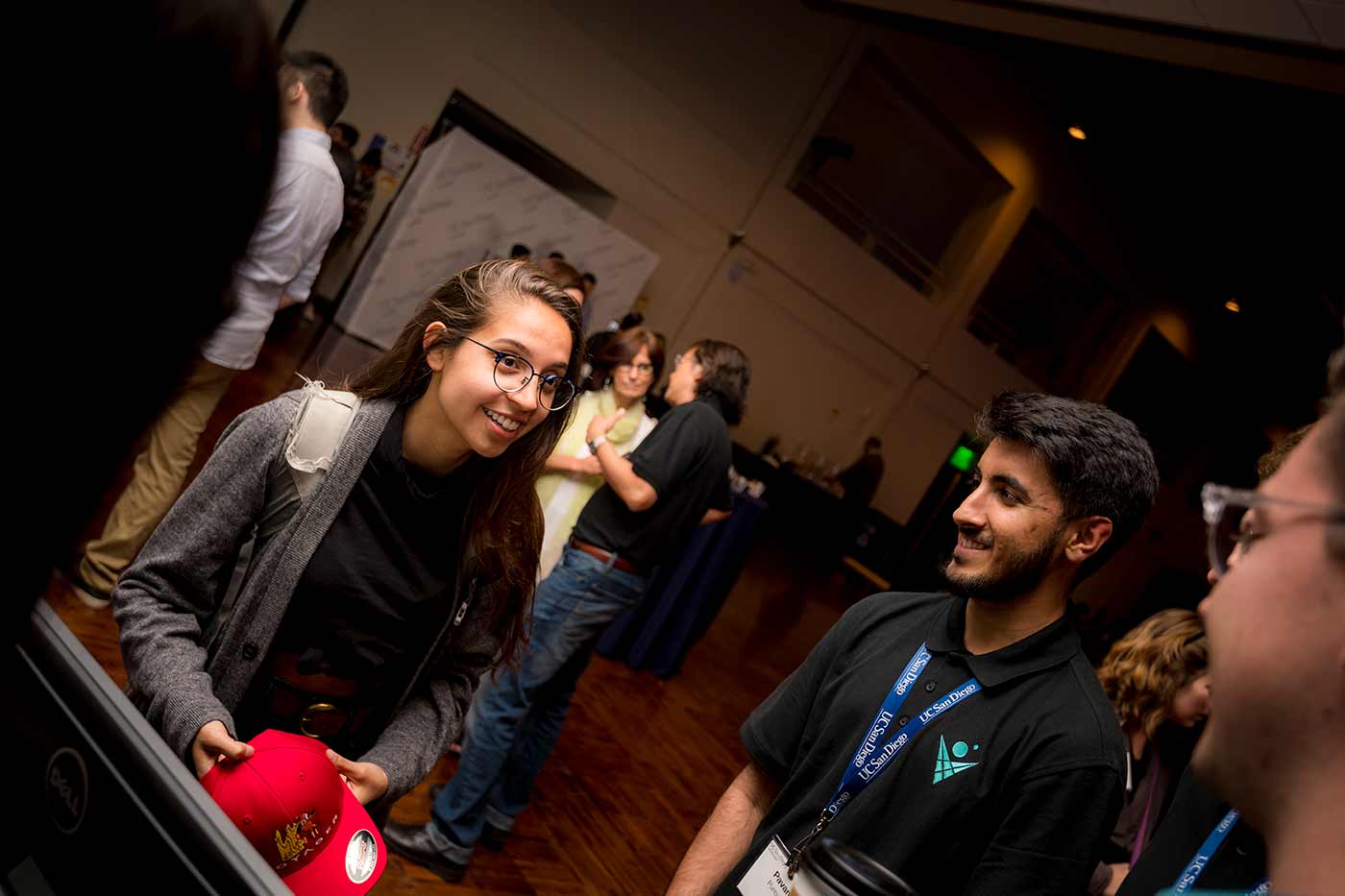
Triton Entrepreneur Night featured 27 student startups, many of which were centered on social innovation. Photo by Erik Jepsen/UC San Diego Publications
They’re also expanding their support through educational and community outreach projects. “During our installation day last quarter, we invited two older kids to help us with installation,” says Hsu. “One of them said they want to go to engineering school afterward.” Also in the works is the development of a low-cost water purification system. Through their efforts, the Baja Del Sol team is contributing to an environment where children living in orphanages can prosper.
Additional information about Triton Entrepreneur Night is available at alumni.ucsd.edu/TEN.
Share This:
You May Also Like
Stay in the Know
Keep up with all the latest from UC San Diego. Subscribe to the newsletter today.


